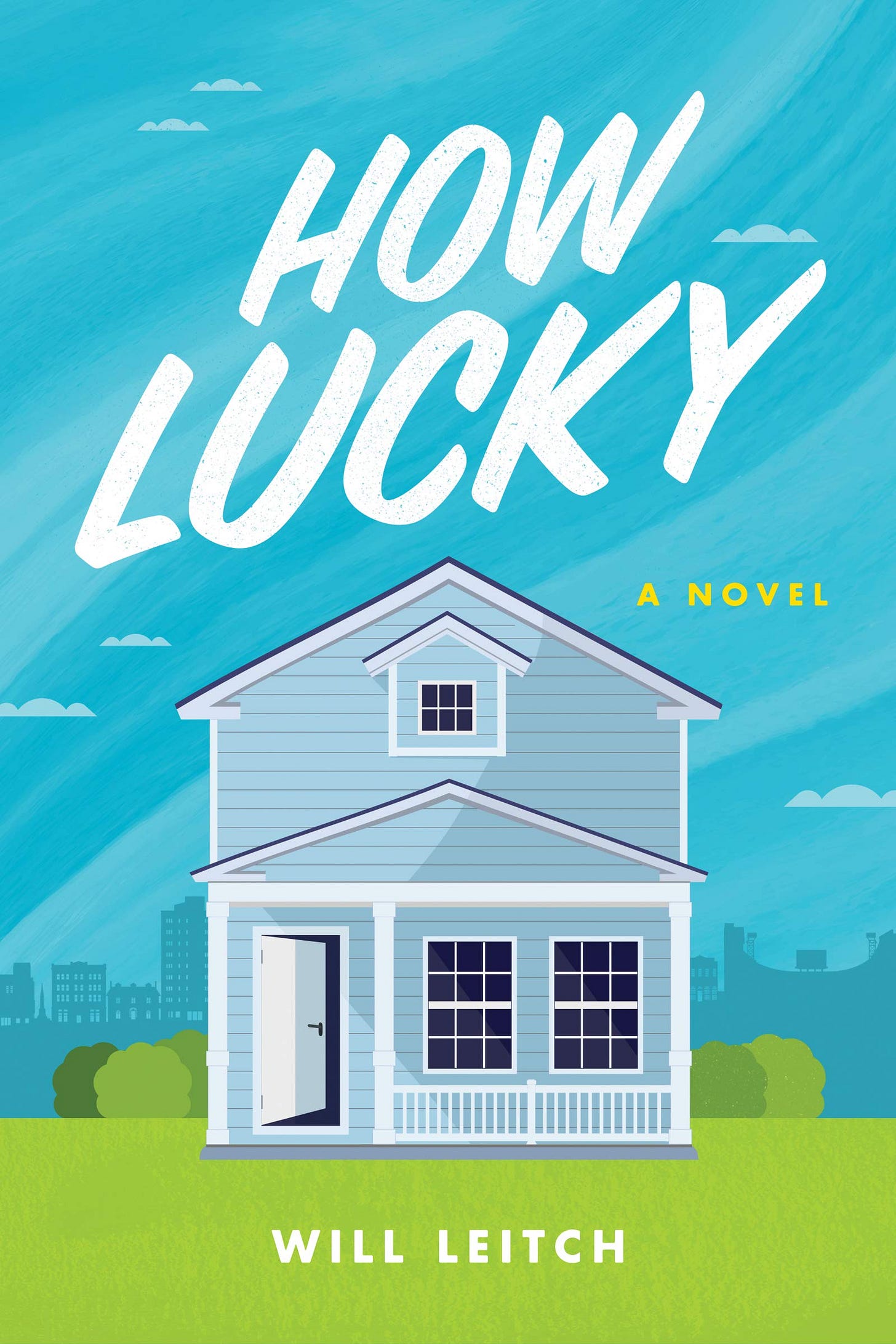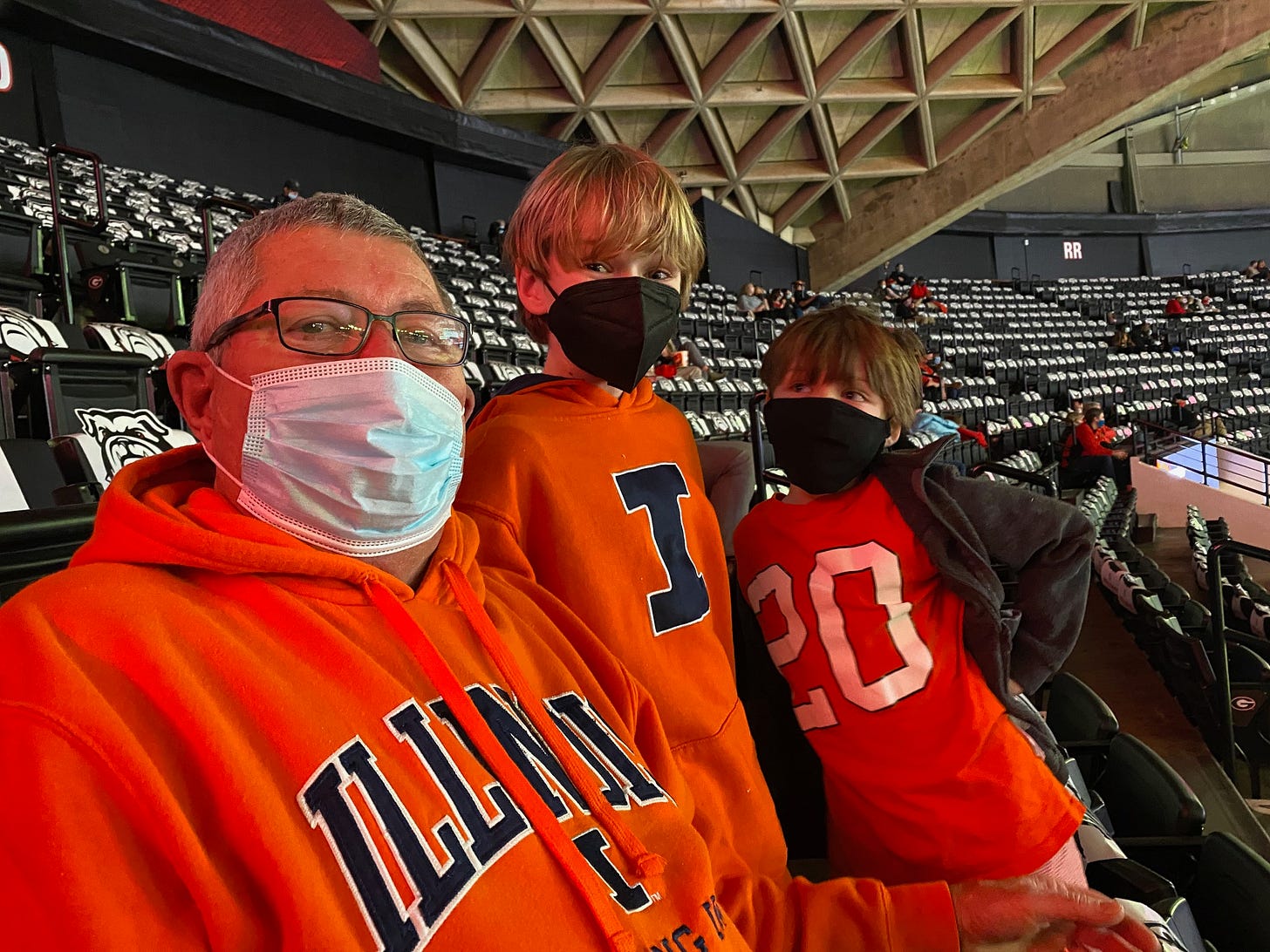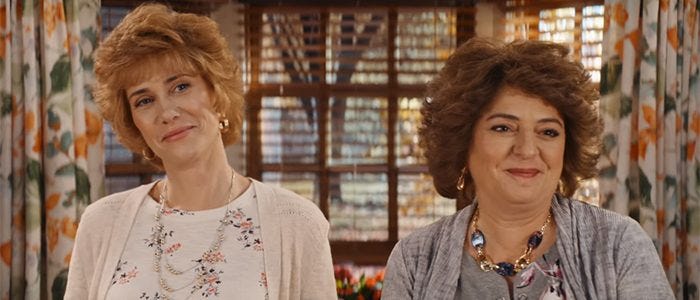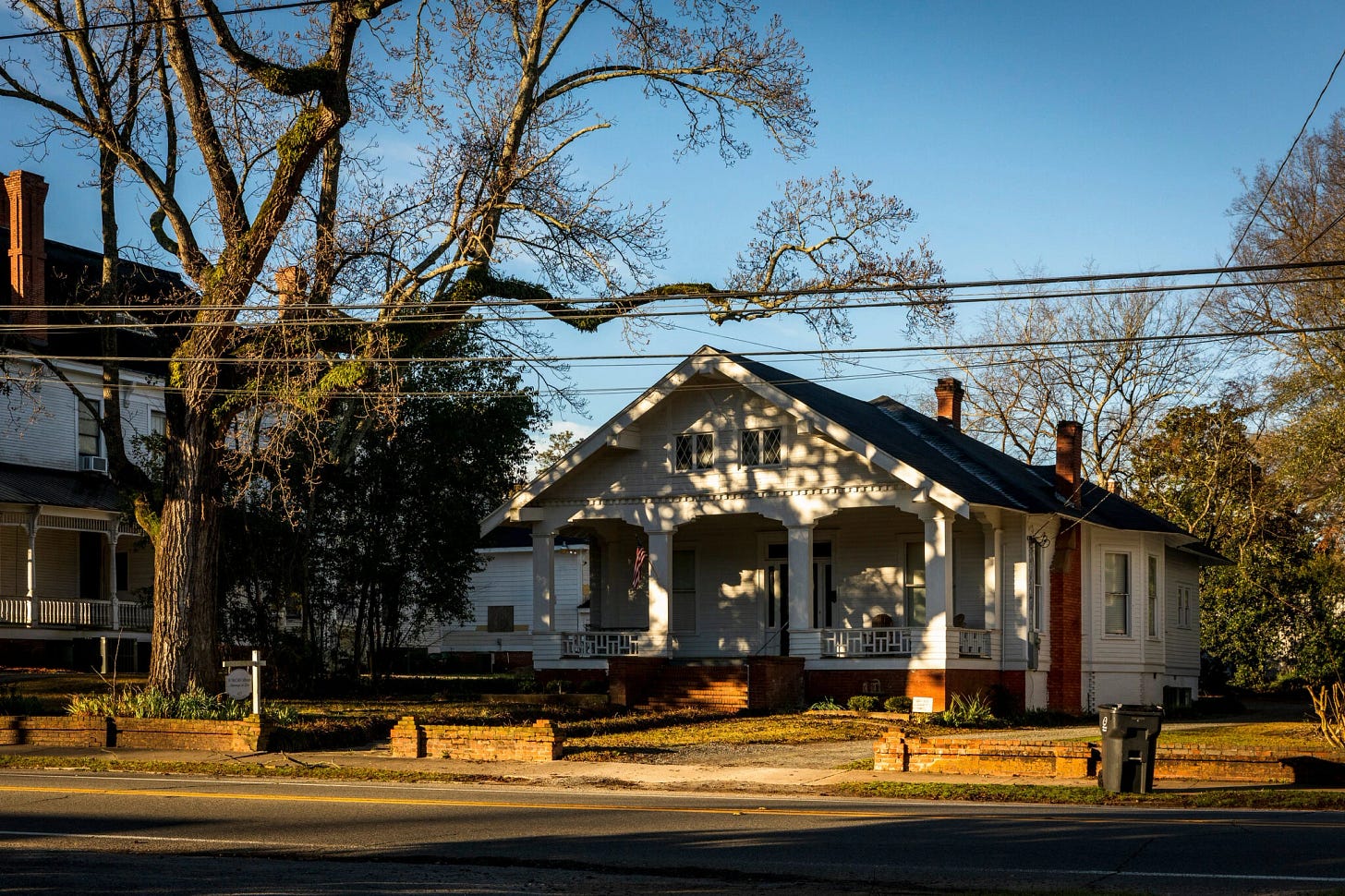Volume 3, Issue 51: Outta Mind (Outta Sight)
"Well I know that we should take a walk, but you're such a fast walker."
Here is a button where you can subscribe to this newsletter now, if you have not previously done so. I do hope that you enjoy it.
Every year, when the boys get a week off for Spring Break, we fly to Florida. My wife’s father has a place in Jupiter, which, hey look at that, happens to be the same town where the St. Louis Cardinals have Spring Training. We don’t go on a lot of family trips: I’m incredibly busy, my wife’s incredibly busy, and our chosen vocations are particularly active during the summer. But we always make sure to take that one. We have a little cottage to ourselves, with a big television with all the sports channels, a mini-hot-tub on the back porch and a running route that takes me directly to Roger Dean Stadium. I find the trip restorative, which I’m told is the point.
Last year, we all boarded a flight at Hartsfield-Jackson International Airport in Atlanta, for West Palm Beach, Florida. It was Saturday, March 7. The boys had said goodbye to all their friends at school the day before. One friend of my older son William shares his obsession with sports, and they were actually putting together a bracket competition involving the SEC Tournament, which would start the next week; they made all their predictions and couldn’t wait to compare their picks when they came back in a week and a half. We’d had our last baseball practice the Thursday before. I told all the kids to remember to still play catch over break, keep their arms loose, and I’d see them the Tuesday we were back. Wynn confessed before he fell asleep on Friday that he’d forgotten to take his backpack home from school, but we told him it was no big deal. He wouldn’t need it in Florida. It’d still be there waiting for him when he got back.
Everyone had heard of the coronavirus by then. It led every morning news telecast, it was on the front page of every newspaper, it had been discovered on a cruise ship outside California, the President was assuring the citizenry that “whoever wants a test can get one.” But it still felt distant, something that likely would reach our shores but couldn’t possibly be that bad. We were the United States, after all. Surely we’re prepared for something like this. Surely we’re all over it. But it was enough of a concern that William thoroughly and studiously wiped down everybody’s seats on the plane before we buckled in. We posted it on social media, ha ha, how cute, aren’t germs funny?
We didn’t think about it much the first couple of days in Florida. It was sunny and lovely outside, and there were baseball games to go to, and pools to jump into. But the news kept creeping in around the edges. Stories of a lockdown in Italy, a school shutdown in San Francisco, a sudden surge of misinformation on social media. I was still working that week, of course, and on Tuesday, March 9, I wrote a column for New York about how sports appeared to be dragging their feet on the coronavirus, how leagues seemed to be trying to wish away the whole matter. Still: It wasn’t at the forefront of my mind. But dominoes kept falling. South by Southwest was canceled; universities told their students not to return from spring break; the economy began to spinwheel. There were nervous conversations, a certain hush when you were out in public. It didn’t feel out of control, though not yet. It felt like something we could still weather.
And then March 11. The storm seemed to gather strength as the day went on. A hospital in Washington state had 15 deaths. Sporting events asked fans to stay home. Broadway shows started to close their doors. We watched a Georgia basketball game, the last game future No. 1 pick Anthony Edwards would play for the Dawgs (he shot 2-for-13), and then I made the boys go to bed. My wife was tired; she laid down to read. But I stared at the television and began to drink, beginning a routine that would last for several months. The White House announced that the President, who was Donald Trump at the time, if you can believe that, would address the nation from the Oval Office. And then he gave this speech. It was … not reassuring.
Within minutes of the end of Trump’s error-riddled, sniffly, blooper-addled, all-together-terrifying speech, Tom Hanks announced on Instagram that he and his wife Rita Wilson had tested positive for Covid-19 and Utah Jazz player Rudy Gobert, who had been seen just a day earlier performatively touching every microphone at a press conference, also tested positive, leading the NBA to immediately pause its season. (The NCAA Tournament would be canceled two days later.) My wife and children were still asleep. I sat on the couch, drinking and, another habit that would last for a while, frantically doomscrolling. I stayed up all night. It could no longer be denied that this was it. Whatever was happening in Italy and Spain and China and Washington state, it was coming to where I and my family were. It was coming everywhere, for all of us.
By the next morning, we all knew. We began to make arrangements to get home. Should we keep our flight? Should we rent a car? Everything we had going in our lives had to adjust to this sudden new reality. The children wouldn’t be back at school; Little League was over; how would we quarantine? We did not know what was coming. But we knew it was going to be bad. And we knew it was going to be big.
Many other travelers had the same idea we did; it was impossible to get a rental car, so we went ahead and took our booked trip home. The airport was as if a bomb had gone off, just a few spare lost souls shuffling past each other. We spoke to no one, touched nothing, looked straight ahead and tried to avoid all human contact until we were back in our house. We then sprinted in the door and all took turns leaping in the shower.
And we’ve lived in that world since. Everyone has their March 11 experience. Everyone has that moment when they realized that everything had shifted, and that all that had come before would feel, from then on, like a long-past, half-remembered dream. We all have our story. None of us will forget that story.
**************
The emergence of Covid-19 was so jarring, so instantly unmooring, and the reality we’ve all lived in for the past 347 days so all-encompassing, that it’s understandable that we’d be resistant to move on from it. So much has happened in those 347 days. Nearly 500,000 Americans have died because of the virus. We’ve had unprecedented social unrest and a justice movement that has already fundamentally altered major aspects of American life forever. An election conducted in the middle of a pandemic. The President screamed through an entire debate, then got Covid, then lost the election, then pretended he didn’t, then started an insurrection. We got a new President, and a woman Vice President. Ruth Bader Ginsberg died; Hank Aaron died. There were so many hurricanes they ran out of letters with which to name them. The Pentagon admitted there were UFOs. California wildfires. Murder hornets. QAnon. Seriously, they tried to invade Congress and murder the Vice President.
It’s reasonable to think it’s never going to end. But it’s going to. And it might even end soon.
Covid-19 isn’t going to be eradicated from the planet; count me among the people who think we’ll be getting a Covid shot every year the rest of our life. But every single trend line is pointing toward being at the tail end of this. From a terrific Atlantic piece from this week, titled “A Quite Possibly Wonderful Summer:”
Many aspects of pre-pandemic life will return even before summer is upon us. Because case numbers guide local policies, much of the country could soon have reason to lift many or even most restrictions on distancing, gathering, and masking. Pre-pandemic norms could return to schools, churches, and restaurants. Sports, theater, and cultural events could resume. People could travel and dance indoors and hug grandparents, their own or others’. In most of the U.S., the summer could feel … “normal.”
The feeling could even go beyond that. The pain wrought by the virus has differed enormously by location, race, and class, but a global pandemic still may be as close as the world can come to a shared tragedy. Periods of intense hardship are sometimes followed by unique moments of collective catharsis or awakening. The 1918 influenza that left the planet short of some 50 million people—several times as many as had just been killed in a gruesome war—gave way to the Roaring ’20s, when Americans danced and flouted Prohibition, hearing the notes that weren’t being played. For some, the summer of 2021 might conjure that of 1967, when barefoot people swayed languidly in the grass, united by an appreciation for the tenuousness of life. Pre-pandemic complaints about a crowded subway car or a mediocre sandwich could be replaced by the awe of simply riding a bus or sitting in a diner. People might go out of their way to talk with strangers, merely to gaze upon the long-forbidden, exposed mouth of a speaking human.
We still have a ways to go. There are many hills still to climb. This is a new virus, and it could act in unusual ways no one could have foreseen. We’ve all been punched in face enough over the last 347 days not to be cautious about anything resembling good news.
But this is all trending the right way. We have all been waiting for signs of this ending, and we are getting every sign that it might be. I have not been vaccinated yet, so I’m not changing any of my behavior; if anything, being this close is a reason to be that much more vigilant. Because we are so close. There are reasons to start making plans. We are not out of it yet. But you can see it on the horizon. You might even see it around the corner.
So I think it is instructive, even vital, to look back at those last moments before everything changed, back to last March, to remember what it was like before. Because we will be back there, and we may be back there soon. We’ve been in this so long that it feels like we will be in it forever. But we won’t. Soon, we will be looking back on this period, telling stories, surely the rest of our life, about what it was like. It’s time to start polishing those stories. Because it will become, like everything else, a story. I frame it like acts of a play. Act One was that March 11 terror until the election. Act Two was the holiday surge and the Big Lie leading to the insurrection. I think Act Three is here now. And I think this particular story has a happy ending. And I think we are almost there. The sun is shining. The snow is melting. The lights are coming back on. It’s OK to believe. You have earned it.
*************
WEEKLY BOOK UPDATE: 11 WEEKS TO LAUNCH
Every week here at The Will Leitch Newsletter, we count down the weeks until the release of How Lucky, my novel that comes out May 11. This is the spot for weekly news, updates and pre-order reminders.
Hey, who’s up for an early galley giveaway? I’ve some galleys to give away, exclusively for newsletter subscribers. I’ve got three, to be exact. All you’ve got to do to enter is: email me the reason you started reading this newsletter in the first place. Where you came across it, where you first started reading this endless stream of words, how you stumbled into this little den of dorkdom. I will pick three entries at random, and I’ll send you the book personally. The only caveats:
You have to still buy the hardcover book when it comes out May 11. I have no way of enforcing this other than begging. But I will beg.
When you finish the book, you have to send me a review to publish in this newsletter. The review can be one line, a paragraph or a whole missive. I will publish this review even if you hate it. But I will preface it with unflattering doodles of your face.
You also have to give the book a review on Amazon and Goodreads. Hopefully everyone will do this anyway.
Sound good? Then email me at williamfleitch@yahoo.com or just respond to this email. Winners will be alerted at the end of this week. We’ll probably do another one of these in a few weeks, if you don’t win this one.
So: You can pre-order the book right now. I’ve had a few people ask whether it makes a difference where they pre-order the book. It doesn’t: It only matters to the purchaser, all told. If you are anti-Amazon—for perfectly good reasons!—there are other options for you on the HarperCollins page, though from what I understand, at some sites you can’t pre-order until two months before the book comes out. Pre-ordering is important, though: It shows the publisher that there are people excited to read the book and thus encourages them further to promote it. So hey, you’re here, reading this far already. Pre-order already.
Here is a numerical breakdown of all the things I wrote this week, in order of what I believe to be their quality.
Adam Kinzinger’s Family’s Letter Is Cruel, Awful and Familiar, Medium. Lots of good pieces this week, I thought, but this was the strongest one.
Jodie Foster Movies, Ranked, Vulture. Such a wild, varied, incredibly long career.
Internet Nostalgia: The Subservient Chicken, Medium. I loved this bit, way back in the day. I told that chicken to do some truly disgusting things.
My Annual Ten Oldest Players in Baseball Piece, MLB.com. You are so old and you will never be young again.
Your National League West Preview, MLB.com. Written before the Tatis extension, not that it changes anything.
The Fans Are Coming Back, New York. I went to a game myself this week. Here are some Illini fans cheering against Missouri (via Georgia).
Is It Time to Start Peeking Your Head Out? Medium. I think there’s a lot of reason for optimism right now?
The Thirty: Who We’re Most Excited About at Spring Training, MLB.com. ARENADO. (I’m just going to keep saying that.)
The NL Central Roundtable, MLB.com. I was a part of this with some very smart baseball people.
PODCASTS
Grierson & Leitch, we discussed “Judas and the Black Messiah,” the wonderful “Barb and Star Go to Vista Del Mar” and “The World To Come.”
People Still Read Books, we’re back! Discussing “Stealing Home” with Eric Nusbaum.
Waitin' Since Last Saturday, no show this week.
Also, I was on the Effectively Wild podcast with Meg Rowley and Ben Lindbergh, previewing the 2021 St. Louis Cardinals. Consider it a temporary Seeing Red podcast replacement.
LONG STORY YOU SHOULD READ THIS MORNING … OF THE WEEK
“How a Hardcore Liberal Lawyer Joined the Pro-Trump Mob,” Richard Faucett and Campbell Robertson, The New York Times. How does a guy go from being a centerpiece of indie rock history—a history right here in Athens—to somehow storming the Capitol? No one is quite sure.
ARBITRARY THINGS RANKED, WITHOUT COMMENT, FOR NO PARTICULAR REASON
Girl Scout Cookies
Thin Mints
Do-si-Dos
Tagalongs
Trefoils
Savannah Smiles
Samoas
ONGOING LETTER-WRITING PROJECT!
Write me at:
Will Leitch
P.O. Box 48
Athens GA 30603
CURRENTLY LISTENING TO
“Opinion,” Nirvana. Famously recorded only once, on a radio station in November 1990, “Opinion” is the great white shark of Nirvana history, a sort of stripped-down, instantly perfect song that pointed toward several decades of history that, obviously, never happened. Whenever I think of how Kurt Cobain’s career might have gone down had he lived, I think of this song.
Remember to listen to The Official Will Leitch Newsletter Spotify Playlist, featuring every song ever mentioned in this section. I even gave the playlist its own photo this week.
Oh, and this … this is … it’s so beautiful.
Have a great weekend, everyone.
Best,
Will









Dude, no: Samoas are the best ones.
Will, you're a tremendous writer. I really enjoy reading you. I love your optimism and I hope you're correct. My wife and I landed in St. Lucia for our honeymoon on March 11. It was surreal seeing how much the United States changed in the week that we were gone. Full flights on the way out, seven people on the plane on the way home. Keep up the great work and kudos on the Thin Mints call. Unquestionably the best.